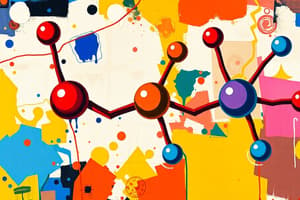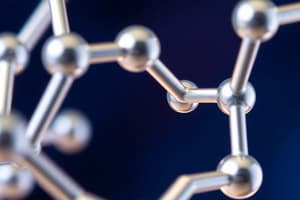Podcast
Questions and Answers
What type of bonds primarily hold organic compounds together?
What type of bonds primarily hold organic compounds together?
- Hydrogen bonds
- Covalent bonds (correct)
- Ionic bonds
- Metallic bonds
Which of the following is NOT a common functional group in organic compounds?
Which of the following is NOT a common functional group in organic compounds?
- Amino (NH2)
- Halogen (Cl) (correct)
- Carbonyl (C=O)
- Hydroxyl (OH)
What do chiral centers refer to in organic chemistry?
What do chiral centers refer to in organic chemistry?
- Hybrid orbitals
- Bonding angles
- Asymmetric carbon atoms (correct)
- Functional groups
In organic chemistry, what is the study of the three-dimensional arrangement of atoms within molecules called?
In organic chemistry, what is the study of the three-dimensional arrangement of atoms within molecules called?
Which element forms diverse and complex bonds, making it crucial in organic chemistry?
Which element forms diverse and complex bonds, making it crucial in organic chemistry?
What is the function of reducing agents in organic chemistry?
What is the function of reducing agents in organic chemistry?
Which reaction type involves the replacement of hydrogen or groups on an aromatic ring?
Which reaction type involves the replacement of hydrogen or groups on an aromatic ring?
In which sector is organic chemistry crucial for drug discovery and synthesis?
In which sector is organic chemistry crucial for drug discovery and synthesis?
Which process involves the replacement of a leaving group by a nucleophile?
Which process involves the replacement of a leaving group by a nucleophile?
What is the primary role of organic chemistry in biotechnology?
What is the primary role of organic chemistry in biotechnology?
Study Notes
Exploring Organic Chemistry
Organic chemistry, a fascinating and vast field within the broader domain of chemistry, revolves around the study and manipulation of carbon-based compounds. Carbon's unique ability to form diverse and complex bonds, primarily through covalent bonds, makes it the lifeblood of organic chemistry. In this article, we'll delve into the intricacies of this subdiscipline, unpacking its fundamental concepts, crucial reactions, and far-reaching applications.
Core Concepts
Organic chemistry is based on several core concepts. These ideas form the foundation upon which the field is built:
-
Covalent Bonding and Hybridization: Organic compounds are primarily held together by covalent bonds, which form between carbon and other elements such as hydrogen, oxygen, and nitrogen. The electrons involved can be distributed in various hybrid orbitals, altering the bonding angles and properties of the molecules.
-
Functional Groups: Key structural elements within organic compounds responsible for their unique properties. Some common functional groups include hydroxyl (OH), carbonyl (C=O), alkyl (R), and amino (NH2) groups.
-
Stereochemistry: The study of the three-dimensional arrangement of atoms within molecules, specifically when chiral centers (asymmetric carbon atoms) are present.
-
Nomenclature: The systematic and unambiguous assignment of chemical names to organic compounds using IUPAC (International Union of Pure and Applied Chemistry) rules and guidelines.
Pivotal Reactions
Organic chemistry is a highly reactive field, and its application is often built on a library of essential reactions. Some of the most commonly used techniques include:
-
Acid-Base Reactions: These reactions involve hydrogen transfer between acids and bases. Proton transfer is a fundamental process in organic chemistry, particularly in the context of acid-catalyzed reactions.
-
Reduction Reactions: Organic compounds can lose electrons to reduce themselves, typically using reducing agents such as metal hydrides, borane, or hydrogen gas.
-
Oxidation Reactions: Organic compounds can gain electrons through oxidation, typically using oxidizing agents such as potassium permanganate, hydrogen peroxide, or chromic acid.
-
Electrophilic Aromatic Substitution: These reactions involve the replacement of hydrogen or other groups on an aromatic ring, typically using electrophiles as the attacking species.
-
Nucleophilic Substitution Reactions: These reactions involve the replacement of a leaving group by a nucleophile, typically occurring at a carbocation center or through the use of SN1, SN2, or SNi mechanisms.
Applications
Organic chemistry has a wide range of applications in various sectors, including:
-
Pharmaceuticals: Organic chemistry is at the heart of drug discovery and synthesis, with many of the world's most crucial medications derived from natural or synthetic organic compounds.
-
Materials Science: Organic materials, such as plastics, polymers, and nanomaterials, are ubiquitous in modern life, with organic chemistry playing a significant role in their development and optimization.
-
Environmental Chemistry: Organic chemistry is integral to understanding and mitigating environmental issues, such as pollution, waste management, and bioremediation.
-
Food and Beverage: Organic chemistry is central to the development and synthesis of flavors, fragrances, and food additives, contributing to the broad range of tastes experienced in everyday life.
-
Biotechnology: Organic chemistry forms the foundation of numerous biotechnological processes, such as the synthesis of recombinant proteins, the production of enzymes, and the development of genetically modified organisms.
Organic chemistry is a vibrant and fascinating field, constantly evolving and pushing the boundaries of human knowledge and understanding. Whether exploring new reactions, developing novel materials, or synthesizing groundbreaking pharmaceuticals, organic chemistry has an integral role in shaping our world.
Studying That Suits You
Use AI to generate personalized quizzes and flashcards to suit your learning preferences.
Description
Test your knowledge on the core concepts, pivotal reactions, and applications of organic chemistry with this quiz. Explore topics such as covalent bonding, functional groups, acid-base reactions, stereochemistry, pharmaceutical applications, and more.


